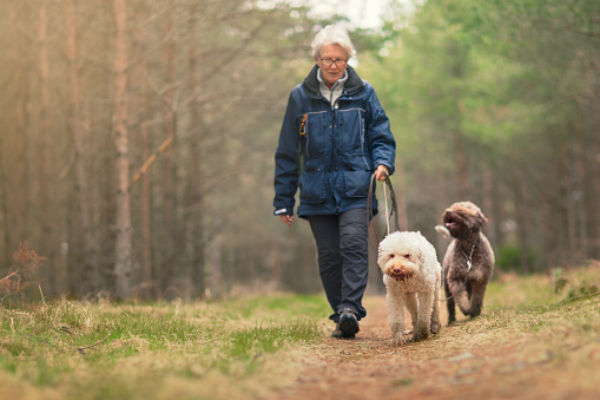Just like people, as dogs get older their bodies, brains, and behavior change. Some of these changes are easy to spot, like sleeping more, but others, like hearing loss, might easily be overlooked. Owners sometimes write off these changes as normal signs of old age, but there is a difference between normal aging and symptoms of something more serious that warrant a visit to the veterinarian. As your dog’s caregiver, it’s important for you to monitor all age-related changes and be on the lookout for any that indicate possible health problems.
Dr. Jerry Klein, chief veterinary officer for the American Kennel Club, advises owners to listen to what their dog is “telling” them. “Do not disregard changes in a dog’s personality, behavior, or health.” He also warns that although certain symptoms of old age may be common, they are not necessarily normal. Be on the lookout for symptoms such as recent weight loss or gain, loss of hearing, or loss of vision. Senior dogs are susceptible to many illnesses, like heart disease, diabetes, kidney disease, or cancer, so it’s important to rule out medical causes. To be safe, monitor your senior dog carefully and discuss any changes you see with your veterinarian to rule out illness.
It’s also important to be aware of any changes in behavior and activity level. For example, a senior dog may begin to go to the bathroom in the house. This could be due to a physical condition, like a bladder infection, inability to make it up and down stairs to go outside due to painful arthritis, or even cognitive changes such as cognitive dysfunction syndrome (CDS), a form of dementia with symptoms similar to those people experience when they have Alzheimer’s disease. Dr. Klein advises watching for any behavioral changes, including “unusual aggression, changes in housebreaking, recent phobias, chewing or swallowing inappropriate objects” because they may be indicators of an underlying medical issue.
Once your dog is a senior, Dr. Klein suggests increasing veterinary visits from once a year to once every six months to help your vet more easily detect early warning signs of illness. “Veterinarians may pick up on any changes or signs of health problems, which may not be noticed by the dog’s owner.” The visit should include a check of the heart, lungs, mouth, ears, anal sacs, blood pressure, and palpation of the abdomen. Basic laboratory tests should also be done, including blood work with a test for heartworm, urinalysis, and a fecal examination.
Of course, dogs with health problems might need more frequent visits. But don’t wait for signs of illness in your pet before heading to the vet. Checkups when your dog is healthy provide important baseline data that increases the ability to detect possible problems later.

Dr. Klein has great advice for the owners of senior dogs. “Treat them as you will want to be treated in your senior years.” He suggests doing all you can to make your older dog’s life consistent and comfortable, in consultation with your family veterinarian about any specific needs. For example, senior canines “will be more sensitive to extremes of climate and may need gear, such a coats and boots, to help them remain comfortable.”
He also recommends adjusting their diet to one suited to this new stage of life. Look for a dog food that is formulated specifically for seniors, with beneficial supplements such as glucosamine, omega-3 fatty acids, and antioxidants. Along with cognitive stimulation, studies have shown this food has the potential to boost your dog’s activity level and interest in playing, as well as help him cope better with change.
Your senior dog also needs an exercise plan that fits his activity level and needs. For example, if your dog is suffering from arthritis, you might consider shorter walks or less vigorous activities. Be sure to keep him fit, but do so with respect for what his older body can handle. And don’t just exercise his body; he needs mental stimulation, as well. “Walks, puzzles, and games provide good mental stimulation for dogs,” according to Dr. Klein.
Remember, although aging is a natural process, you need to keep your eye on your dog’s appearance and behavior, and consult with your veterinarian about any changes. If you provide your senior dog with quality and age-appropriate care, even if he develops age-related issues, he can stay happy, healthy, and active for as long as possible.


